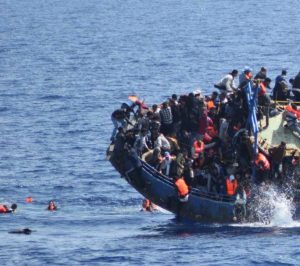Europeans’ support for refugees unwavering
Europeans remain welcoming of refugees despite the Ukraine war and the arrival of an increasing numbers of migrants fleeing humanitarian crises, new research has found.
A survey published in the journal Nature found people in Europe are as supportive of refugees now as they were seven years ago, despite several humanitarian crises.
“These results demonstrate that support for asylum-seekers has increased despite the repeated crises… and that this increase in support extends broadly to all refugees, not just to Ukrainians, and is also shared among voters on both ends of the political spectrum,” the research report says.
But the study, titled ‘Europeans’ support for refugees of varying backgrounds is stable over time’, also found Europeans seem to favour certain demographics over others – often those that most closely mirror their own identities.
The research, prompted by the refugee crisis resulting from Russia’s invasion of Ukraine, examined whether the influx of refugees with more cultural similarities to their host communities had changed the views of the European public on who they want to accept.
The researchers, from the Swiss Federal Institute of Technology and Berkeley University, in the US, had previously surveyed European attitudes towards asylum seekers in 2016, amid the Syrian refugee crisis.
They surveyed 18,000 participants in 15 countries in 2016, and 15,000 in the same 15 countries in 2022.
They presented participants with pairs of randomly generated refugee profiles, which differed in traits such as age, religion, gender, occupation and reason for migration. The participants were asked how likely they were to let each refugee stay in their country and were asked pick only one from each pair to succeed.
In both years, participants were more likely to favour younger refugees over older ones, women over men, and Christians over agnostics and Muslims. Among the least favoured characteristics were being Muslim, moving for economic opportunities and lacking the language skills of the host country.
People in Europe are as supportive of refugees now as they were seven years ago, despite several humanitarian crises, finds a huge survey on attitudes. But they seem to favour certain demographics over others — often those that most closely mirror their own identities, the study found.
Co-author Professor Dominik Hangartner said: “There is an inherent bias in the manner in which people who are not used to otherness perceive other groups”.
The European Union activated its ‘temporary protection’ scheme for the first time in February 2022, giving Ukrainian refugees the ability to live, work and attend school in the EU without official asylum approval.
At the time, critics asked why the same rights hadn’t been granted to refugees from other countries, such as those in Africa and the Middle East.
Prof Hangartner says that gathering data on public perceptions can inform policies by showing that most people do not have the extreme negative views reflected by certain European anti-asylum policies.
“Those you hear in the political arena are sometimes the loudest voices and are not representative necessarily of their constituencies,” he said.
Co-author and Berkeley political scientist Kirk Bansak said it was important to consider the research results in a global context.
“Seven or eight years ago, we had what’s been termed the Syrian refugee crisis, in 2015 and 2016. That, of course, was largely driven by the Syrian civil war, and it led to what was then the largest influx of refugees on the European continent since World War II,” he said.
“Now fast forward to 2022: There have been so many Ukrainian refugees that this has become the new largest influx of refugees in Europe since World War II.
“In this context, some important questions come to mind: With these repeated humanitarian emergencies and the consistent strain on Europe’s asylum system, has there been a general decline or fatigue in the European public’s willingness to accept asylum-seekers? Has this continued strain altered the patterns of support in terms of the types of asylum-seekers Europeans prefer?
“The first key finding relates to the welcome Ukrainians have received. We do find it’s driven partially by their nationality, but more importantly it’s driven by their distinctive demographic, religious and displacement profile, relative to asylum-seekers from other countries.
“But another key result is the stability in the total amount of support Europeans have for asylum-seekers overall. The degree of responsibility they’re willing for their region to shoulder — we have found that has not actually decreased, as one may have feared, due to some sort of compassion fatigue over time. Instead, support remains relatively unchanged since 2016. If anything, it’s actually increased,” Mr Bansak said.












